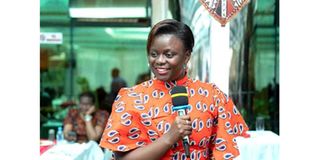Meet Nelly Munyasia, a reproductive health rights champion

Nelly Munyasia, the executive director of Reproductive Health Network Kenya (RHNK), gives a sexual and reproductive health rights' talk in Nairobi.
What you need to know:
- After completing her training in nursing at the Kenya Medical Training College, Ms Munyasia felt dissatisfied with her clinical nursing profession.
- At the RHN, she runs a network of over 600 trained healthcare providers across 44 counties and a model facility at Embakasi.
Growing up in Bungoma, a small town tucked away in Western Kenya, presented a mixed bag of possibilities for curious Nelly Munyasia.
“Back then, there was a preference for boys to pursue their education, while girls were married off at a very young age. Their [reverse] dowry would then be used to educate boys. Although I didn’t quite understand why, I assumed that the preference was our culture and that is how it was supposed to be,’’ she recounts.
It was by sheer luck that her father was a progressive who invested in his daughters' education. Today, Ms Munyasia is the executive director of Reproductive Health Network Kenya (RHNK). She grew up questioning gender inequalities in her hometown and is now at the forefront of championing sexual reproductive health rights (SRHR) for marginalised groups.
After completing her training in nursing at the Kenya Medical Training College, Ms Munyasia felt dissatisfied with her clinical nursing profession.
“I felt that my role was limited to just taking care of patients. There wasn't any leeway for me to conduct research or advocacy,’’ she says. “When I got the opportunity to join the SRHR field, I felt it was the perfect space for me to fight for the rights of women and girls in this country."
She was drawn to the field after seeing women and young people being denied their reproductive health rights.
"Reproductive health rights are not discussed openly due to the stigma associated with reproductive health. As much as our Constitution has clauses for reproductive healthcare, most marginalised groups do not have access to this information."
In her current role, she works with the national and county government to develop progressive reproductive health policies and holds the state accountable to commitments such as those made by former President Uhuru Kenyatta at the International Conference on Population and Development (ICPD) Conference in 2019.
At the RHN, she runs a network of over 600 trained healthcare providers across 44 counties and a model facility at Embakasi.
"We work with practitioners such as doctors, clinical officers and nurses who are licensed and have complied with Ministry of Health guidelines. We support them by building their capacity through skills development and ensuring that they access medical commodities at subsidised rates."
Areas of interest
The network of professionals focuses on post-abortion care, provision of contraceptives, HIV testing and cancer screening. Her work has been internationally recognised by international organisations such as the Bill & Melinda Gates Foundation, which awarded her their WomenLift Health Fellowship. Additionally, Planned Parenthood Global awarded her the Global Citizen Award in 2020 for her unwavering SRHR advocacy.
Her journey has, however, not been a rosy one. She says that operating in a patriarchal society with entrenched cultural beliefs has made her work difficult.
“There are communities where men still decide whether their wives should access contraceptives. In such cases, there is little to no information on safe motherhood and the importance of child spacing."
In humanitarian crises such as the current drought that Kenya is experiencing , Ms Munyasia says interventions are rarely gender-sensitive.
"A lot of the responses are concentrated around providing food but not reproductive healthcare. No one thinks about women who need safe antenatal care, condoms or contraceptives when they are fleeing from crises. This exposes them to HIV and STI infections."
She explains that RHN has been unable to reach women inMarsabit ,Garissa and Moyale counties because of insecurity concerns. “Sometimes we provide services from the boots of our vehicles. We have to turn the cars into makeshift mobile hospitals and follow women as they flee crises."
Being blind to reproductive healthcare needs in such situations, she says, can erode progress made by interventions.
“This was the case in Kilifi where girls were exchanging sex for Sh50 to buy pads. When sanitary towels were provided, they didn’t even use them because they already got pregnant due to lack of contraceptives and age-appropriate sexual and reproductive health information."
Granted that Kenya is grappling with multiple threats revolving around women’s reproductive health such as female genital mutilation (FGM), rising cases of sexual and gender-based violence (SGBV) and teenage pregnancies, Ms Munyasia opines that reproductive healthcare should take centre stage in government policies.
She says political goodwill is needed to implement the many policies that Kenya has committed to. “There is a renewed wave of religious resistance to the reproductive health agenda. This is why the Sexual Reproductive Health Policy has been shot down so many times. The government should also increase funding in the field to reduce over-reliance on donors and development partners.’
Despite the numerous challenges, she says she couldn’t imagine working in any other space.





